

Online commenting: the age of rage. For a while after his first TV series was broadcast in 2009, comedian Stewart Lee was in the habit of collecting and filing some of the comments that people made about him on web pages and social media sites.

He did a 10-minute Google trawl most days for about six months and the resultant collected observations soon ran to dozens of pages. Profoundheterogeneity. “I am sitting here, six in the morning, I am staring at two people bascially naked in the shower together with 30 people watching and its like uh okay, but that’s the future.”
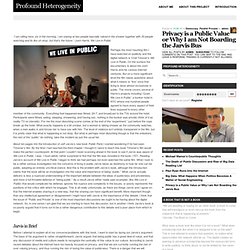
-Josh Harris, We Live in Public Perhaps the most haunting film I have watched on publicity and the digital network is Ondi Timoner’s We Live in Public. On the surface the documentary is about the Josh Harris and his various internet ventures. But on a more significant level the film raises questions about what it means to “live” once that living is done almost exclusively in public. Life in the Age of Extremes - Bill Davidow - Technology. The Internet causes connections to multiply and strengthen, creating a frenzy of positive feedback, which can drive people apart--not together Optimists have long dominated the cyber-landscape, firm and vocal in their belief that the Internet creates a more transparent world, and that the quick and easy access to information it provides is bringing the global population together into one enlightened chorus of harmony.
What it Means Today to be 'Connected' - Lucy P. Marcus. By Lucy P.

Marcus | 12:10 PM October 13, 2011 Only connect! That was the whole of her sermon. Only connect the prose and the passion, and both will be exalted, and human love will be seen at its height. Live in fragments no longer. I was recently selected as one of Britain’s “best connected” women by Director, a business magazine. Connecting with people and innovative ideas is more important than ever. Culture Desk: Bigger Brother: The Exponential Law of Privacy Loss. This past Tuesday, Facebook made a deal with the F.T.C.: from now on, the social-networking company can no longer humbug us about privacy.
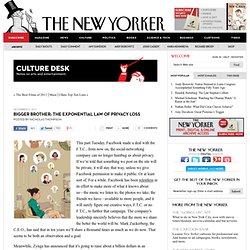
If we’re told that something we post on the site will be private, it will stay that way, unless we give Facebook permission to make it public. Or at least sort of. For a while. Facebook has been relentless in its effort to make more of what it knows about us—the music we listen to, the photos we take, the friends we have—available to more people, and it will surely figure out creative ways, F.T.C. or no F.T.C., to further that campaign.
Rate This Article: What’s Wrong with the Culture of Critique. Technology Provides an Alternative to Love. Two decades of the web: a utopia no longer. Evgeny Morozov traces the development of the web from the laboratories of the Cold War to the world of venture capital and big money The “virtual community”: an idea that was the antithesis of Cold War paranoia.
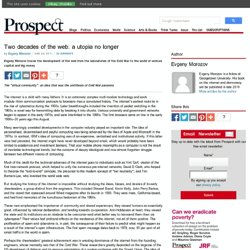
The End of the Web? Don’t Bet on It. Here’s Why. Fred Wilson recently posted a great video on his blog with the CEO of Forrester Research, George Colony.

The money slide is the graphic below. Could the Internet Ever Be Destroyed? The raging battle over SOPA and PIPA, the proposed anti-piracy laws, is looking more and more likely to end in favor of Internet freedom — but it won't be the last battle of its kind.

Although, ethereal as it is, the Internet seems destined to survive in some form or another, experts warn that there are many threats to its status quo existence, and there is much about it that could be ruined or lost. Physical destruction A vast behemoth that can route around outages and self-heal, the Internet has grown physically invulnerable to destruction by bombs, fires or natural disasters — within countries, at least. Web freedom faces greatest threat ever, warns Google's Sergey Brin. The principles of openness and universal access that underpinned the creation of the internet three decades ago are under greater threat than ever, according to Google co-founder Sergey Brin.
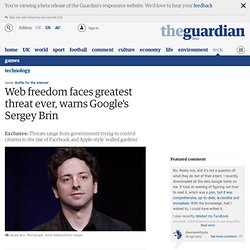
In an interview with the Guardian, Brin warned there were "very powerful forces that have lined up against the open internet on all sides and around the world". "I am more worried than I have been in the past," he said. "It's scary. " The threat to the freedom of the internet comes, he claims, from a combination of governments increasingly trying to control access and communication by their citizens, the entertainment industry's attempts to crack down on piracy, and the rise of "restrictive" walled gardens such as Facebook and Apple, which tightly control what software can be released on their platforms.
Censoring the Internet: It's Not Just for China Any More! - James Fallows - Technology. Stop Online Piracy Act: Can the geek lobby stop Hollywood from wrecking the Internet? Chip Somodevilla/Getty Images.
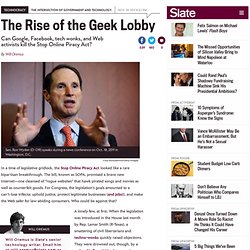
In a time of legislative gridlock, the Stop Online Piracy Act looked like a rare bipartisan breakthrough. The bill, known as SOPA, promised a brave new Internet—one cleansed of “rogue websites” that hawk pirated songs and movies as well as counterfeit goods. For Congress, the legislation’s goals amounted to a can’t-lose trifecta: uphold justice, protect legitimate businesses (and jobs!) , and make the Web safer for law-abiding consumers. Who could be against that? Stop Online Piracy Act and Protect IP Act, a pair of bills that threaten Internet freedom. Photograph by Sean Gallup/Getty Images.

The United States of America was forged in resistance to collective reprisals—the punishment of many for the acts of few. US internet providers hijacking users' search queries - tech - 04 August 2011. Read full article Continue reading page |1|2 Editorial: "Hijacking web searches for cash threatens net success" The NS Profile: Tim Berners-Lee. Twenty years ago, Tim Berners-Lee launched the World Wide Web among a small circle of fellow computer enthusiasts. Today, the 56-year-old Briton remains one of the internet's most vigorous advocates. Its vast success, however, has had a downside: it has exposed him to a bombardment of requests from visionaries, obsessives and rubberneckers, as well as hordes of children demanding help with school projects. How I’d Hack Your Weak Passwords. How Two Scammers Built an Empire Hawking Sketchy Software.
Illustration: Alvaro Tapia Hidalgo Before they built an international underworld empire — before they weaseled their way onto millions of computers, before their online enterprise was bringing in hundreds of millions of dollars a year, before they were fugitives wanted by Interpol — Sam Jain, now 41, and Daniel Sundin, 33, were just a couple of garden-variety Internet hustlers. The two, who met around 2001, started out with a series of relatively modest scams and come-ons. Capitalizing on post-9/11 paranoia, Jain sold anti-anthrax gas masks. Exploiting the anxieties of aspiring non-English-speaking immigrants, he helped run a green card lottery site that tricked applicants into paying for an INS form that the government provides for free.
Together, the two men sold gray-market or counterfeit versions of popular software. Hacked! - Magazine. Anonymous 101: Introduction to the Lulz. Think Again: Cyberwar. "Cyberwar Is Already Upon Us. " One Per Cent: Anonymous members tricked into giving up bank details. Jacob Aron, technology reporter (Image: Isopix/Rex Features) "Is the Web Closing?" by Esther Dyson.
Exit from comment view mode. Click to hide this space. We, the Web Kids - Alexis Madrigal - Technology. Culture Desk: How to Get Privacy Right. Here’s a news cycle to get used to: a story breaks about a big technology company doing something that sounds like an invasion of privacy; then there’s outrage, and either an apology or a denial. Sometimes a class-action suit follows.
Then everything gets forgotten until another week or two passes, and the cycle renews. Scamworld: 'Get rich quick' schemes mutate into an online monster. 398inShare Jump To Close. Malware and computer viruses: They’ve left porn sites for religious sites. AFP/Getty Images. How To Tell Who’s Tracking You Online. I'm Being Followed: How Google—and 104 Other Companies—Are Tracking Me on the Web - Alexis Madrigal - Technology. Big Mac Attack: Apple Security Bruised after OS X Infections. "Cyber War and Peace" by Joseph S. Nye. Cyberwarfare: what Richard Clarke and other fearmongers get wrong.